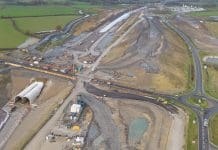With infrastructure strategies at the top of the agenda, how does the industry attract the talent needed to deliver the next generation of major projects?
Infrastructure is vital to our economy and way of life. It provides one of the foundations we need to work, live healthily and enjoy leisure.
Extraordinary skills and ingenuity are needed to manage the complex and vital projects being carried out in the infrastructure sector. There are a number of resourcing strategies that might be implemented by organisations to achieve the sector’s primary objectives, including:
• Modernising the approach to recruitment;
• Identifying and attracting the next generation of recruits;
• Attracting experienced people from related industries;
• Modernising the industry and promoting excellence;
• Mobilising projects more quickly;
• Accelerating the delivery time of projects;
• Providing excellent training and expanding career opportunities.
Now to explore a couple of these in more detail.
Modernising the approach to recruitment
Attitudes to work reflect the employment market; the general trend since the 1980s might best be summarised as follows:
• People live and work much longer.
• Technology and the emergence of new industries have accelerated changes in the workplace, including a greater likelihood of losing a job (without any perceived stigma that may have been present before the 1980s).
• People no longer expect to have a ‘job for life’. Therefore, there is a greater propensity for people to change jobs or even industries with relative ease.
• There is much greater flexibility – for both employers and employees – which is much more suitable for the current employment market.
These changes need to be reflected in the approach to recruitment, which must be more flexible, friendly and informative.
In order to attract and retain people, conventional recruitment or HR practices alone cannot be relied upon. The strategy, therefore, should incorporate techniques that most people refer to include marketing, sales and public relations.
• Marketing: Identify who needs to be attracted to the industry and understand what they need and want from any career that the sector can offer them. Keep them fully informed about the infrastructure industry so that they can understand it and feel that they have already formed a relationship with it before they even apply for a job. The information provided must be expressed in language that means something to the target group.
• Sales: During the recruitment process, use sales techniques. This means talking specifically about the benefits of the industry and the roles that are available as well as assessing candidates for their education, skills and attitude.
• Public Relations: In order to attract and retain people, the infrastructure sector and individual projects need good PR. This affects people’s perceptions and, for those working in the sector, good PR can improve morale and job satisfaction.
It must be emphasised, however, that it is not just about the messages. It is vital to continue to develop the sector in a way that makes it an excellent place to work and therefore attracts and retains a highly skilled, fully motivated and well-paid workforce.
All employing organisations – particularly the larger ones, professional institutions and trade associations – should be applying this strategy.
Providing excellent training and expanding career opportunities
The engineering, property, construction and infrastructure industries have, from time to time, expressed concern about the difficulties of recruitment and one of the many reasons that employers have cited is that school-leavers and graduates do not come to them with the right skills.
This is in contrast to other industries (notably the tech and finance industries), which take the view that the skills gained by school-leavers and graduates are the starting point for a comprehensive training programme that turns each recruit into the finished article. As a result, they are able to create a highly trained, highly paid workforce.
Given the diversity of requirements of different parts of the infrastructure sector or, indeed, different employers, it is naive to expect new entrants to be prepared for every type and size of employer. The best way of producing a skilled workforce is to create different expectations and a different balance between education and employer training.
There is a view within many industry sectors that it takes a certain amount of time to become professionally qualified. In most cases, the length of time required to qualify in various disciplines has changed very little over the last few decades, despite the enormous gains in productivity created by the continued advance of digital technologies.
This is in conflict with the aims of new generations that have been brought up in the age of digital technology and want to advance their careers at the very earliest date. The strategy therefore must include:
• Accepting the fact that graduates and school-leavers will need significant training after they start work;
• Preparing a suitable training programme for a variety of roles;
• Emphasising the opportunities for online training and learning methods that can be carried out in short modules wherever possible and be used at any time and any place;
• Relating pay and rewards to the performance on the training scheme;
• Communicating the excellence and benefits of the training scheme during the recruitment process;
• Continually uplifting the standard of training to create a highly productive, highly paid workforce that attracts more and more people to the industry.
This should be used by all employers, professional institutions, trade associations, further and higher education authorities.
You would think it would be easy to attract and retain the best people to the many excellent organisations that represent the infrastructure industry. To some extent it is, but the sector always appears to have a gap in resources and faces bigger changes and challenges ahead.
Continue reading about all seven infrastructure strategies…
This article has been extracted from the Infrastructure channel available on RICS isurv. The section is maintained by Stan Hornagold, Director at Stay Out Front.
Find out more about isurv, how the information portal could benefit you, and to register for your free trial at: rics.org/isurvhub
RICS Training also has an online Commercial Management in Infrastructure distance learning course starting soon – aiding professionals to gain the fundamental skills required to work as a Commercial Manager on infrastructure programmes. Find out more at: rics.org/inframanager
RICS
Tel: 024 7686 8584









![[VIDEO] Heathrow’s third runway plan wins out over Arora London, United Kingdom – May 31, 2023: A commercial airliner taking off at London's Heathrow Airport, representing plans for a third runway](https://www.pbctoday.co.uk/news/wp-content/uploads/2025/11/iStock-2143084103-218x150.jpg)




